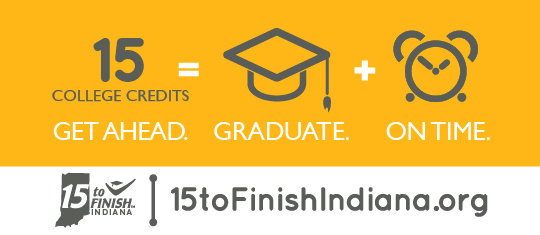Zayna
Haliburton

Oklahoma’s 15 to Finish Initiative is a way
to promote on-time degree completion through an emphasis on defining
“full-time” status of enrollment in 15 credit hours per semester or 30 credit
hours per year (okhighered.org). Is the 15 to Finish Initiative a step in the
right direction for Cameron University students to graduate within four years
and what are the effects it has on the students?
Assistant Vice President for Academic
Affairs and head of the office of teaching and learning Margery Kingsley said
the 15 to Finish is an initiative with the organization Complete College
America. Complete College America is about getting more students across the
United States to finish college degrees.
“15 to Finish is built on some pretty
basic math. A lot of people think about college as a four year degree program
and the idea is that you want to get finished in four years, but people also
think about 12 hours as full-time and if you actually do the math it takes
about 120 hours [to about] 124 hours to graduate from college.”
Kingsley said that would actually take you
an extra year if you did just 12 hours each semester without taking any summer classes
and the idea is to get students enrolled in enough hours each semester so that
students can graduate in four years.
With more hours comes student course load
and Kingsley said that is dependent on the individual student. The student is
going to have to consider whether they can handle a 15 hour load with other
commitments in their lives and also make sure that by taking 15 hours the
student knows how they will finance that.
“Overall the idea of getting students
through college in that four year window and helping them make an informed
choice, helping them understand that if they don’t take the 15 [hours] then
they are kind of prolonging that college experience," Kingsley said. “I think
that’s really what [15 to Finish] is all about.”
Kingsley said students taking 15 or more
hours has gone up over the last 10 years.
“Our first time [full-time] freshmen this
fall about 39% of them were actually taking 15 or more hours.”
Kingsley said that with incoming freshmen
transitioning from high school to college can be challenging and that advisers
don’t want to do anything to put students in jeopardy and as advisers it is
important to talk to students about what they are comfortable with taking.
“We try to balance the courses that they
are taking so that we don’t have them in 15 hours of incredibly hard or
incredibly time consuming classes.”
It’s not unusual to see a lot of incoming
college students dropping at least one class in the first semester because it’s
a transition period of students getting use to college and college classes.
Kingsley said that there are a lot of students who need to be full-time for
financial aid, athletics, or other purposes.
“If they’re in 15 [hours] they have that
opportunity to drop that class that may not be clicking for them and still be
full-time,” Kingsley said. “Where as in the past we actually would see sometimes
students staying in a class that they were not being successful in and may even
choose to stay in it and fail it rather than drop it simply because they had to
stay full-time.”
Kingsley said that by taking 15 hours it
provides room for students that have a class that just may not be working for
them to drop. There are students who are able to finish the 15 hours and do it
easily and some even more than that.
Kingsley said that the 15 to finish can
leave some misunderstandings with students feeling that they have to take extra
hours.
“I think sometimes there’s a perception
that oh my gosh there’s all this extra work without an understanding that’s
it’s not really extra work in the long run,” Kingsley said. “It’s just an
attempt to help the student finish the college degree more quickly.”
Advisement Specialist in the Cameron
Academic Advising Center Cody Flood use to be a recruiter for Cameron at one
point and said that she believes that high school students are prepared to take
on the 15 hours.
“As
long as they have the mentality to do what they need to do,” Flood said. “Yes I
think students for the most part are prepared to take on that course load
depending on the courses they are taking.”
Flood said that as an adviser she does not
like to put students in courses that may overload them. She said that Cameron
does provide students with a lot of academic resources such as the Math Lab,
Center for Academic Success, Center for Writers, Wellness Center, and tutoring
services.
“We have a lot of resources available for
our students,” Flood said. “Whether they are taking 15 or 12 [hours] [the
resources] can help them so maybe in future semesters they feel confident to
take 15.”
According to the Complete College America
website there is a college completion crisis. “The barriers to student success
are clear: low credit enrollment, poorly designed and delivered remedial
education, overwhelming and unclear choices, and a system out of touch with the
needs of students who must often balance work and family with their coursework
(completecollege.org).”
The 15 to Finish has really taken affect
at Cameron for three years now, but it is important to take in the effects a
more demanding load would have on students even before or after the 15 to
Finish has been encouraged.
Senior Education Major,
Kylie Erricson is a PLUS scholar and has to be a full-time student in order to
keep the scholarship. Full-time at Cameron is still 12 hours, however, the PLUS
scholarship only pays for four years of college. This means that these students
would have to take at least 15 hours within the semester or summer classes to
complete their degrees and have their tuition paid for.
Erricson said there have been semesters
where she had taken 12 hours and others where she had taken 15.
“When I took 12 hours, I definitely
noticed having a lighter workload,” Erricson said. “I had a lot more free time
which was great because I was working retail at the time.”
Erricson said that she did not feel that
taking 15 hours was harder, just a bit more time consuming and that her
classwork load has never been an issue with completing her PLUS requirements.
Senior Journalism and Media Production
major, Cheyenne Cole said that she realized she was not on track to graduate in
four years after looking at her degree works.
“I was in my third year of college but I
was still considered a sophomore so that’s when I realized that it (the hours)
was off,” Cole said. “I had always taken the recommended amount of 12 hours so I
thought that that didn’t add up and then I realized they really expect you to
do more than 12 hours.”
Cole said that during her junior year she
decided to take 18 hours one semester and she noticed a huge difference.
“It was kind of a culture shock to go from
12 to 15, 18 [hours],” Cole said. “It’s been incredibly hard to do.”
She said that earlier in her college
experience she did not have many outside obligations. Within the last two years
she has added on a part-time job in addition to working on the Cameron
Collegian currently as the Managing Editor which can make taking on more
classes even harder.
Though Cole was advised before the 15 to
Finish was in effect at Cameron she feels that taking more than four years to
complete a degree because a student takes less hours is not a bad thing.
“To stress people out as much as I feel
stressed, I just wouldn’t want this for anyone,” Cole said. “Even if they have
to take five years to complete the degree I think it may be worth it for them
to just spend a little extra time doing that and not be as worried all the
time.”
5% of students complete their associate
degree within two years and 19% of students complete their bachelor’s degree
within four years and it is Complete College America’s mission to change that
with certain strategies, one being 15 to Finish (completecollege.org).


Sources
Homepage. (n.d.). Retrieved December 04, 2017,
from http://completecollege.org/
Welcome From Chancellor Glen D. Johnson. (n.d.).
Retrieved December 04, 2017, from http://www.okhighered.org/
No comments:
Post a Comment